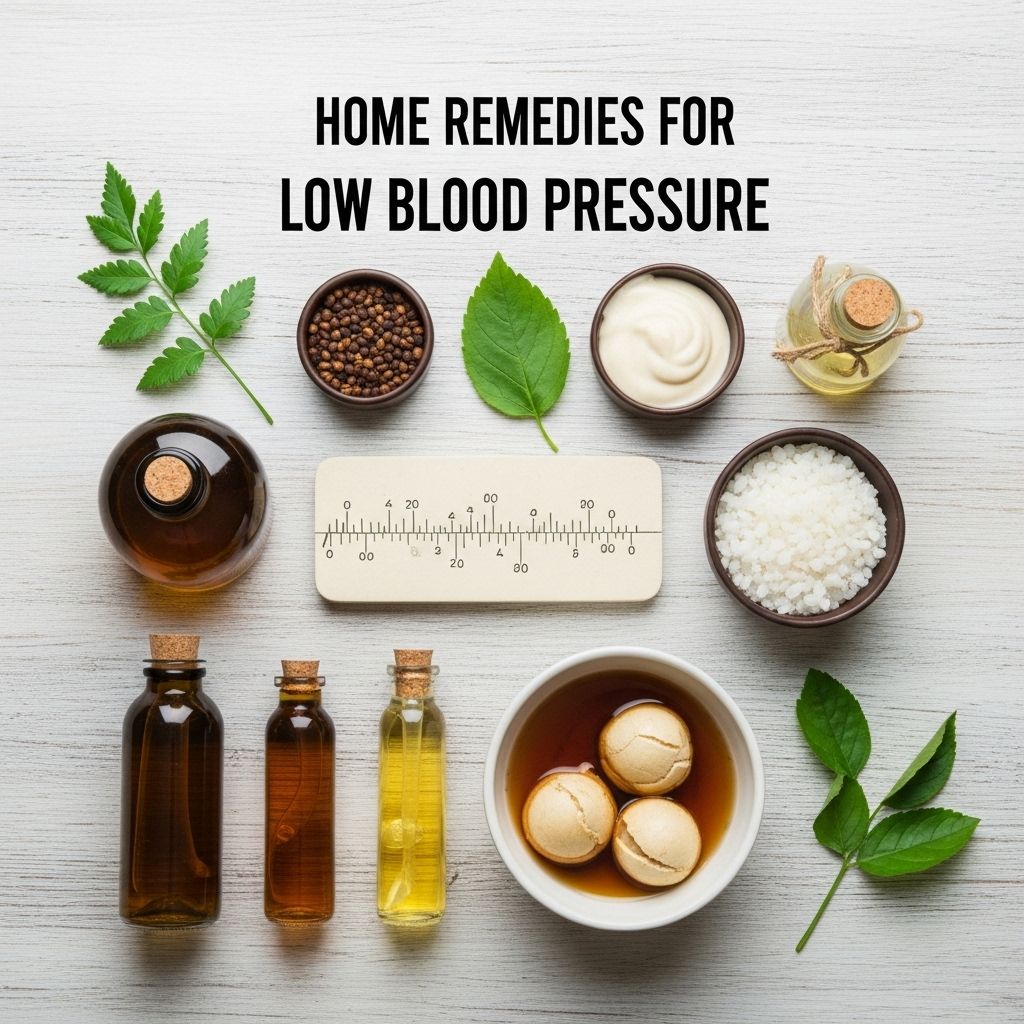8 Home Remedies for Low Blood Pressure
Natural tips to ease dizziness and boost energy levels day after day.

Understanding Low Blood Pressure
Low blood pressure, or hypotension, is a condition characterized by abnormally low blood pressure, which can lead to symptoms such as dizziness, lightheadedness, and even fainting. While it is often associated with few symptoms and is less risky than high blood pressure, it can still pose health risks if not managed properly. This article explores effective home remedies and lifestyle adjustments to help safely raise and maintain healthy blood pressure levels.
Remedies for Low Blood Pressure
1. Vitamins
Vitamins B12 and E are particularly beneficial for individuals with low blood pressure.
Vitamin B12
plays a crucial role in treating anemia, which can contribute to low blood pressure. Foods rich in vitamin B12 include almonds, spinach, sweet potatoes, eggs, milk, cheese, and fish. Additionally,vitamin E
supports overall cardiovascular health but should be avoided by those with high blood pressure. It is essential to consult a healthcare provider before taking any supplements. 2. Coffee
–
Why It Works:
Coffee is rich in caffeine, which can temporarily increase blood pressure by constricting blood vessels.–
How to Use:
– Add 1-2 teaspoons of coffee powder to a cup of water.
– Bring to a boil, then simmer for 5 minutes.
– Allow it to cool slightly before drinking.
– Drink two cups daily.
3. Green Tea
–
Why It Works:
Like coffee, green tea contains caffeine, though less, which can help raise blood pressure.–
How to Use:
– Steep 1 teaspoon of green tea in a cup of hot water for 5-10 minutes.
– Drink 2-3 cups daily.
4. Rosemary Oil
–
Why It Works:
Rosemary oil contains camphor, which can stimulate circulation and improve respiratory function.–
How to Use:
– Mix 6 drops of rosemary oil with 1 tablespoon of carrier oil (coconut or olive).
– Massage onto the body or add to bath water daily.
5. Salt Water
–
Why It Works:
Salt increases blood volume by retaining water.–
How to Use:
– Mix ½ teaspoon of salt with a glass of water.
– Drink only when experiencing a sudden drop in blood pressure, as excessive salt can be harmful.
6. Ginseng
–
Why It Works:
Ginseng can raise blood pressure in low doses but may increase it further in high doses.–
How to Use:
– Steep 1 teaspoon of ginseng tea in a cup of water for 5 minutes.
– Drink 2-3 times daily.
7. Holy Basil (Tulsi)
–
Why It Works:
Holy basil offers numerous health benefits, including lowering stress and improving circulation.–
How to Use:
– Crush 10-15 leaves and mix the juice with a teaspoon of honey.
– Consume once daily.
Additional Lifestyle Adjustments
Stay Hydrated
Drinking at least 8-10 glasses of water daily is crucial for maintaining blood volume and pressure. Coconut water and oral rehydration solutions can also be beneficial, especially during hot weather or after exercise.
Dietary Changes
Eating small, frequent meals helps prevent sudden drops in blood pressure. Incorporating salted nuts, electrolyte-rich broths, and homemade soups can provide essential electrolytes.
Wear Compression Stockings
Compression stockings help reduce blood pooling in the legs, which can increase blood pressure.
Cross Legs While Sitting
This simple action can help increase blood pressure by improving circulation.
Frequently Asked Questions (FAQs)
Q: What are the symptoms of low blood pressure?
A: Symptoms include dizziness, lightheadedness, fainting, and blurred vision. If these persist, consult a healthcare professional.
Q: Can I use all these remedies at once?
A: It is best to start with one remedy and gradually add others, monitoring your blood pressure and any side effects.
Q: Are there any risks associated with these remedies?
A: While generally safe, excessive use of salt or caffeine can be harmful. Always consult a healthcare provider before starting new remedies.
Conclusion
Managing low blood pressure effectively involves understanding the condition, incorporating natural remedies, and making lifestyle adjustments. By combining these strategies with regular medical check-ups, individuals can maintain healthy blood pressure levels and improve their overall quality of life.
References
- https://www.stylecraze.com/articles/effective-home-remedies-for-low-blood-pressure/
- https://www.medanta.org/patient-education-blog/low-blood-pressure-symptoms-causes-home-remedies
- https://www.healthline.com/health/high-blood-pressure-hypertension/lower-it-fast
- https://www.medicalnewstoday.com/articles/319506
- https://www.stylecraze.com/articles/blood-pressure-after-exercise/
- https://www.mayoclinic.org/diseases-conditions/low-blood-pressure/diagnosis-treatment/drc-20355470
- https://www.bhf.org.uk/informationsupport/heart-matters-magazine/medical/how-to-treat-low-blood-pressure
- https://manhattancardiology.com/blog/what-to-eat-to-help-raise-low-blood-pressure/
Read full bio of medha deb








